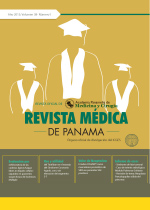El Cáncer de mama, una verdadera epidemia en nuestra región
Autores/as
DOI:
https://doi.org/10.37980/im.journal.rmdp.20221896Palabras clave:
cáncer de mama, prevención, salud reproductiva, necesidades insatisfechasResumen
El cáncer de mama es una amenaza constante para todas las mujeres, y dentro de las neoplasias que las afecta es la más común. Proporcionalmente hablando, una de cada cuatro mujeres con una tumoración maligna, desarrollará cáncer de mama. Lamentablemente esta condición viene incrementándose con el paso del tiempo, a pesar del trabajo educativo de las organizaciones mundiales y regionales de salud, al igual que todos y cada uno de los países individualmente.
Si es lamentable el elevado número de casos de cáncer de mamá en nuestra región, es alarmante la cantidad de mujeres que mueren por esta patología. Cerca del 15% de todas las muertes por cáncer tendrá como causa el cáncer de mama. Pero es alarmante que este número se mantiene en aumento con el pasar de los años, y es más preocupante que no solo se esté incrementando esta patología en mujeres cada ves más jóvenes, sino que su hallazgo inicial, en porcentaje importante de casos, se da ya con metástasis presente.
Es urgente que, en América Latina, se incrementen las actividades tendientes a educar a las mujeres sobre este cuadro, como prevenirlo o detectarlo tempranamente, al igual que se incremente el número de equipos radiológicos para que más mujeres puedan ser atendidas tempranamente, y así reducir su incremento en la región.
Por otra parte, es conocido el hecho de que la salud sexual y reproductiva es un derecho para todos, incluido en la Declaración Universal de los Derechos Humanos. por consiguiente, este derecho específico debe ser observado por todos los países que integran las Naciones Unidas. Cuando hablamos de salud reproductiva, estamos señalando el derecho de poder tener hijos, decidiendo cuantos y donde. Por ende, es un derecho del hombre y la mujer como pareja, como familia y como una unidad.
En nuestra región por cuestiones de educación mal entendida el machismo campea por todas partes, y relega a la mujer la prevención del embarazo no deseado, en momento y circunstancia, como si no fuera una responsabilidad compartida. Los métodos de planificación familiar se han desarrollado tanto para hombres como mujeres, son estas últimas las usuarias de estos métodos y muy poco los hombres.
Esta tendencia está comenzando a cambiar en algunos países de nuestra América latina, en los cuales se ha introducido al hombre como participante, usando métodos para prevención de embarazos, lo cual es un gran paso hacia la corresponsabilidad de la pareja, en esta materia.
En este número de la revista, se presenta un interesante estudio en el que se identifica por primera vez factores y necesidades insatisfechas de planificación familiar en hombres de América Latina, teniendo como foco del estudio países de América del Sur y Central.
Publicado
Número
Sección
Licencia
Derechos de autor 2022 Infomedic Intl.Derechos autoriales y de reproducibilidad. La Revista Médica de Panama es un ente académico, sin fines de lucro, que forma parte de la Academia Panameña de Medicina y Cirugía. Sus publicaciones son de tipo acceso gratuito de su contenido para uso individual y académico, sin restricción. Los derechos autoriales de cada artículo son retenidos por sus autores. Al Publicar en la Revista, el autor otorga Licencia permanente, exclusiva, e irrevocable a la Sociedad para la edición del manuscrito, y otorga a la empresa editorial, Infomedic International Licencia de uso de distribución, indexación y comercial exclusiva, permanente e irrevocable de su contenido y para la generación de productos y servicios derivados del mismo. En caso que el autor obtenga la licencia CC BY, el artículo y sus derivados son de libre acceso y distribución.






